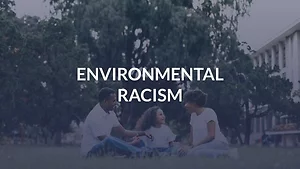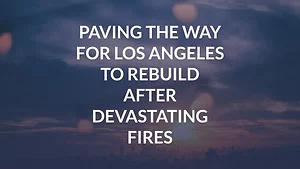Homeowner’s insurance is a vital safety net for Californians, especially in areas prone to natural disasters such as wildfires. Yet, recent trends indicate that obtaining adequate coverage has become increasingly harder. Premiums are escalating, coverage options are diminishing, and insurance companies, such as State Farm, are dropping policyholders and non-renewing policies at an alarming rate.
For those affected by the Eaton Fire and other recent disasters in the Los Angeles County area, important deadlines are approaching. The Small Business Administration (SBA) and the Federal Emergency Management Agency (FEMA) have set March 31, 2025, as the final day to apply for disaster relief assistance. If you are considering financial assistance for recovery, it is critical to act before the deadline. Even if you are unsure whether you will need the funds, applying now preserves your eligibility, as you will not be able to apply after the deadline passes.
Environmental racism highlights systemic issues in how environmental policies are designed and enforced. It refers to the unequal exposure of communities to environmental hazards based on race or socioeconomic status. This pattern often stems from decisions about zoning, industrial development, and resource allocation that disproportionately affect marginalized communities.
After months of dry conditions, rainfall is a welcome sight in Los Angeles. For many, it signals relief, limits the fire risk, clears the air, and replenishes much-needed water reserves. But for communities near recent wildfire burn scars, heavy rain can be a threat. As storm systems move across Southern California, they carry the potential to trigger dangerous mudslides and debris flows in areas that have been stripped of vegetation by fire.
The Eaton wildfire left a devastating mark on Altadena, California, a historically significant community nestled in the foothills of Los Angeles County. Known for its charm, diversity, and deep-rooted sense of community and friendship, the neighborhoods of Altadena have been turned to ash. Among those affected was the community of middle-class Black families that had created a tight-knit community starting in the 1960s and 70s when redlining practices pushed them out of the city and into the hills of Altadena. The losses this community now faces extend far beyond property– their lives have been shattered, with many grieving the deaths of loved ones and the destruction of cherished memories and community.
As the catastrophic fires in Los Angeles and surrounding areas continue to burn, Mayor Karen Bass has issued a sweeping Executive Order aimed at expediting recovery and rebuilding efforts for the thousands of Angelenos affected. With over 25,000 acres burned, more than 5,000 homes and businesses destroyed, and 80,000 residents displaced, the time for swift and decisive action is now.
This Executive Order, dubbed the “Return and Rebuild” initiative, is a comprehensive plan to streamline recovery processes, reduce bureaucratic barriers, and provide immediate relief to impacted communities. Below are the key provisions of the order and what they mean for affected residents.
In September 2024, California Gov. Gavin Newsom signed Senate Bill 1414 into law, making it a serious felony to purchase sex from a minor under the age of 16. While this is a step forward, it’s not enough to protect survivors and hold perpetrators accountable. The reality is that the demand created by buyers fuels the entire sex trafficking industry—and until buyers are held accountable in a more meaningful way, we will continue to fight an uphill battle against trafficking.
Human Trafficking Prevention Month serves as a crucial reminder of the ongoing battle against sex trafficking. For years, society has relied heavily on the criminal justice system and victim advocacy to address the national crisis of human trafficking. While these efforts are invaluable, there is an underutilized avenue for combating trafficking that has the potential to create systemic change: the civil justice system. This tool actively disrupts trafficking networks by delivering justice for survivors, holding profiteers accountable, and cutting off the resources ...
If you are a homeowner who’s insurer cancelled or non-renewed your policy and you subsequently experienced fire damage in California, you may be eligible to file a claim against the insurance company. Losing your home in a wildfire is devastating, you should not have to deal with the unjust practices of insurance companies on your own. Contact Singleton Schreiber to learn more about how we may be able to help you.
When facing a serious health condition, understanding how to seek justice and recover damages is crucial—especially when the harm results from the use of a prescribed medication. This is particularly true for women who used Depo-Provera, and its generic equivalents, for birth control. Recent medical research suggests that prolonged use of the injectable contraceptive Depo-Provera may increase a women’s risk of developing a meningioma, a type of brain tumor, by over 400%.










